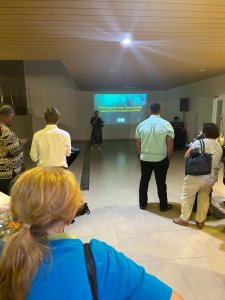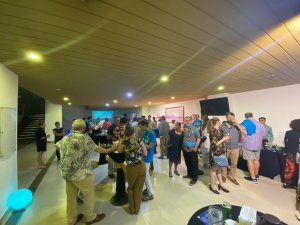Every year, each of the tuna RFMOs holds a full session where member-states send delegations representing their nation’s interests. It is here where binding agreements can be negotiated to regulate and reform the industry. This is also where the GTA’s advocacy can be at its most impactful.
Using its advocacy positions and considering evidence from the latest scientific research, the GTA will produce a position statement document ahead of the commission meeting. This will be then be sent to the RFMO, representing a list of asks from the supply chain and retailers.
We then construct a campaign around these asks which is implemented in the weeks and months prior to the meeting, putting pressure on delegations to listen to the voice of the market.
Take a look through our overarching asks to RFMOs over the past few years:
After turning up with fortune cookies at the 19th Session of the WCPFC in Da Nang, Vietnam, we decided we couldn’t travel to the Cook Islands for the 20th Session empty-handed!
Continuing with the theme of fortune and prophecies, we decided to convert the red miracle fish toys that you may be used to seeing in your childhood in Christmas crackers or party bags. If you’re not familiar though, the idea is that you hold the fish in your palm of your hand and it’s movements will tell you how you’re feeling.
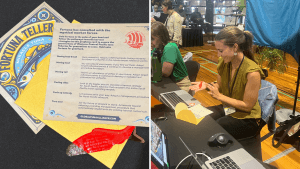
We decided to convert the miracle fish into a miracle tuna, swapping out the generic instruction cards with our own prophecies. For example, if you held fortuna in the palm of your hand and it moved its tail, your prophecy would be: “There’s an abundance of yellow in your future. Adopt target reference points & continue to develop a management procedure for yellowfin.”
At present, if you’re a seafood sourcing manager looking to buy sustainable tuna, your best bet is to look at the Western-Central Pacific Ocean (WCPO), unique in its status among all other regions for the perfect “green” status of all its tropical tuna stocks, indicating that none are overfished or subject to overfishing.
However, without harvest strategies – which apply management frameworks that monitor and control catch levels to ensure the long-term health of a stock – their “green” statuses are under threat. Falling “out of the green” could have devastating consequences, with several tuna fisheries losing their Marine Stewardship Council (MSC) certification, a prime indicator among buyers and consumers alike of a product’s sustainability.
At the 20th Session of the Western-Central Pacific Fisheries Commission (WCPFC), the GTA’s primary ask was to accelerate harvest strategies for all tropical tuna stocks, to give the market the confidence it needs to commit long-term to sourcing from the WCPO.
For last year’s campaign, the GTA handed out fortune cookies at the WCPFC meeting venue with prophecies that mixed old proverbs with the GTA’s asks. This year, we wanted to build on the theme of prophecy and fortune.
Focusing on the idea that the future of stocks in the WCPO are left to fortune without harvest strategies, we came up with line: “Secure a future fortuna,” playing on the fact that the word “fortune” is derived from the Roman Goddess, Fortuna.
The keystone visual
We wanted to bring our own “fortuna” to life, imagining a prophecy-telling fortune fish.
On social media, inspired by Zoltar, the animatronic fortune-telling machine, we produced a series of posts which featured fortune cards dispensed from our own “Fortuna” machine, again, mixing those traditional prophecy-esque lines with the GTA’s harvest strategy asks.
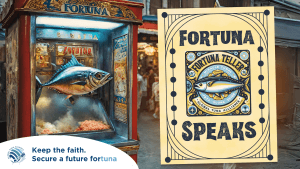
We then brought fortuna into real life. Using the well-known red miracle fish toy, a common item found in Christmas crackers and party bags, we reimagined it as a tuna fish, swapping out the instruction card so that it matched up the movements of the fish with the GTA’s asks.

It provided another engaging talking point at the meeting, highlighting that the delivery of the message is sometimes as important as the message itself.
It’s reassuring to know that a stock of tuna is not currently overfished, but underpinning the market’s confidence in sourcing sustainable tuna is the security of knowing that in ten or twenty years, stocks in that region will still be healthy.
In the Atlantic Ocean, bigeye and yellowfin tuna stocks are in a precarious position. Disagreements between nations on determining catch allocations meant an interim tuna conservation measure was adopted in 2021. However, it is contingent on delegates each year coming back to agree to roll over the measure.
So, how can tuna buyers be confident in making a long-term commitment to sourcing sustainable tuna from a region when the conservation measure meant to keep stocks healthy only lasts for a year at a time?
This defined the GTA’s main ask at this meeting: for a multi-annual, long-term conservation measure that maintains yellowfin and provides a road map to rebuilding the bigeye stock in 15 years.
In forming a campaign, we focused on the idea that some forms of sustainability are more efficient than others. We compared recycling a single-use object – which while environmentally positive, consumes a lot of energy – to making an object which stands the test of time and applied this to the scenario of rolling over the interim measure.

Simply put, why recycle the same plan over and over again, when delegates could choose instead to make a plan that lasts?
As well as the more conceptual graphic above, we produced a more on-the-nose visual to really drive home our point: that taking the same old measure out of the recycling bin each year is not the most efficient way for ICCAT to achieve its sustainability goals.
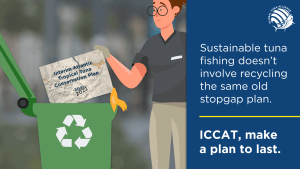
The Indian Ocean Tuna Commission are the management organisation responsible for managing tuna stocks in the Indian Ocean. We needed a campaign idea that really emphasised the fact that everyone is calling for the same thing; our hero message to ‘rebuild yellowfin tuna before it’s too late’. As well as the market calling for this (via GTA Partners), scientists and NGOs also had this as their main plea, and it was paramount that the IOTC listen.
We played with the line ‘rebuild the yellowfin tuna stock’ with the well-known line ‘follow the yellowbrick road’ from the Wizard of Oz. The clip of Dorothy being told what to do by various munchkins very much mirrored the pleas of various groups (scientists, NGOs, retailers) telling the IOTC to rebuild yellowfin tuna. A meme might seem like an unconventional method of communication for environmental advocacy, but in a world where our social media feeds are saturated, standing out and doing something different is integral to being seen.
The meme was supported by a roadmap of the steps needed for healthy Indian Ocean yellowfin tuna stocks. This was quite literally, a yellowbrick road paved with actionable steps which the IOTC can take. The campaign was supported by a suite of more serious messaging and factual infographics which outlines the science, stats, and story behind the main campaign ask.
The road to rebuilding yellowfin tuna is signposted with actionable steps. This is the roadmap that the GTA is calling #IOTC delegates to follow with the ultimate objective of rebuilding overfished yellowfin tuna by 2030. #RebuildTheYellowfinRoad
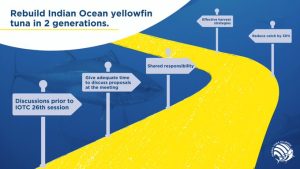
India is one of six countries who objected to the yellowfin tuna rebuilding plan in the Indian Ocean in 2021’s IOTC meeting. They weren’t replying to our letters calling for them to agree to proposed catch limits for the stock, so in advance of 2022’s IOTC meeting, we placed adverts in 2 of India’s newspapers. Krishak Jagat, India’s Agriculture Newspaper (est. 1946, 2.5 million readers) and the Economic Times Ahmedabad (6 million readers).
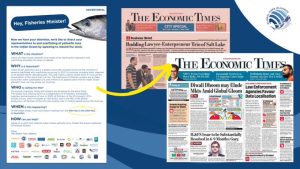
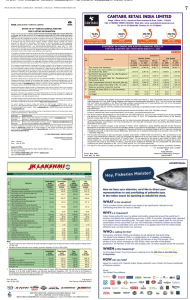
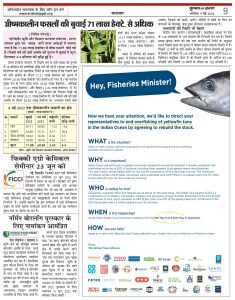
In 2021, tuna fisheries in the Western-Central Pacific Ocean (WCPO) held a prestigious status. With no stocks currently overfished or subject to overfishing, it was the most sustainable region to procure tuna in the world. However, in the Summer of that year, the MSC sounded an alarm bell that unless the Western-Central Pacific Fisheries Commission (WCPFC) took steps to implement management procedures by December 2022, several fisheries would be at risk of losing their MSC certification.
There is an obvious difficulty in building a campaign to demand the implementation of harvest strategies in an area that has healthy stocks. However, the MSC gave us a hook which we knew would strike a chord with decision-makers, subject experts and consumers alike.
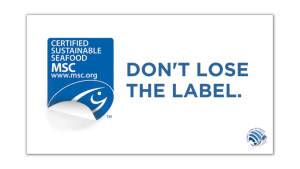
As an internationally-recognised label, the MSC label holds significant power in determining what seafood products global consumers will buy. Indeed 49% of seafood consumers recognise the iconic blue label. The threat of losing it would likely precipitate a collapse in confidence from suppliers and retailers in procuring tuna from the WCPO.
Thus, the simple message of “Don’t lose the label” was born, which we paired with a simple but striking image of an MSC label partly peeled off, indicating that while fisheries were heading towards losing the certification, there was still a chance to save it.
The Western-Central Pacific Fisheries Commission (WCPFC) is the management organisation responsible for managing tuna stocks in the Western-Central Pacific Ocean (WCPO). The WCPFC has a unique and prized status among all other Regional Fisheries Management Organisations (RFMOs). Not only is it the region where the highest amount of tuna is fished, making it a hugely important source of food for millions, it is also the only region where all major stocks of tuna are not overfished or subject to overfishing.
Last year’s advocacy campaign ahead of the 18th full session of the WCPFC focused on the campaign tagline “Don’t lose the label,” reflecting the fact that many tuna fisheries in the WCPFC that are MSC certified may have their certification at risk unless harvest strategies were adopted by December 2022. This was a consumer-facing campaign, taking advantage of the influence that the blue MSC label has as a recognisable mark of sustainability in driving consumer behaviour.
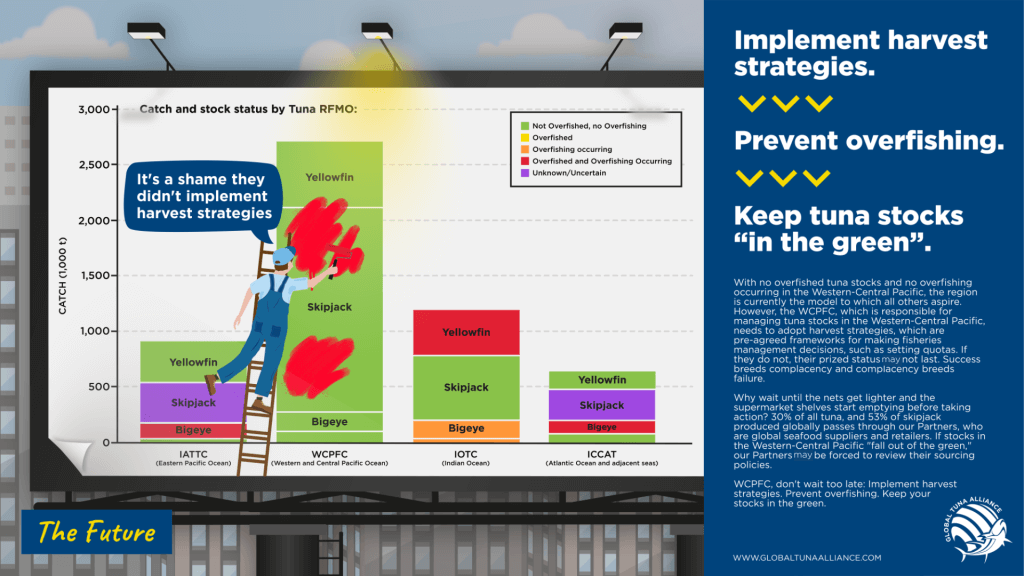
This year’s campaign was more delegate-focused. We wanted to play on the pride felt by WCPFC delegates about the healthy statuses of their stocks by producing a campaign graphic that showed the tarnishing of this reputation if delegates failed to implement harvest strategies and prevent overfishing. We used a bar chart that’s very recognisable to delegates showing stock statuses across each RFMO and the WCPFC’s bar being coloured over by a billboard painter in red as a consequence of them failing to adopt harvest strategies. This sits next to the campaign message: Implement harvest strategies, prevent overfishing and keep your stocks ‘in the green.’ and a message that says your commercial credibility as a sustainable place to do business will be damaged unless you act.
We took advantage of the return of “in-person” RFMO meetings by sending our Director, Dr. Tom Pickerell to Da Nang, Vietnam where the 19th full session of the Western-Central Pacific Fisheries Commission (WCPFC) meeting was taking place. He went armed with GTA-branded fortune cookies, postcards, and a print-out of our position statement.
Fortune Cookies
Our fortune cookies, which were placed next to every seat at the meeting, contained messages combining old proverbs with a tuna twist, encouraging the delegates to accelerate the implementation of harvest strategies, for example: “To reach your targets, first you must set them. Agree a revised workplan for setting target reference points for yellowfin and bigeye in 2023.” While it doesn’t exactly roll off the tongue, it was an interesting way of delivering the market’s message. They also went down swimmingly, with one attendee at the conference remarking on Twitter: “Bravo GTA, you have won first prize for my favourite ever RFMO delegate gift. Inspired!”
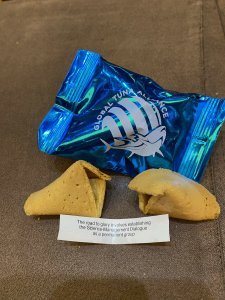
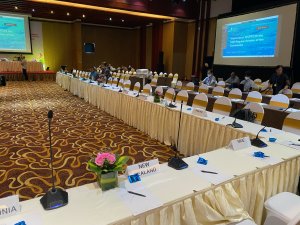
Postcards and print-outs
We also distributed Postcards featuring our hero graphic on one side and blurb on the reverse, this was a bite-sized way of getting the take-home message to WCPFC delegates. We also printed our 8-page position statement for a more detailed look at exactly what changes the market wants to see and why.

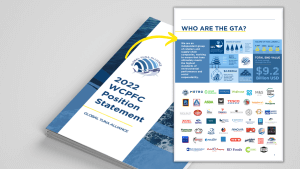
NGO Tuna Forum side-event
The NGO Tuna Forum and Global Tuna Alliance hosted a side-event during the week-long meeting. This was an opportunity for delegates to come along and hear from GTA Partners and others. As well as having all of the above materials, the side-event also featured a short video with written and spoken quotes from GTA Partners, and in-person speeches from GTA Director Dr. Tom Pickerell and Ruth Hoban, Head of Sustainability at New England Seafood.
